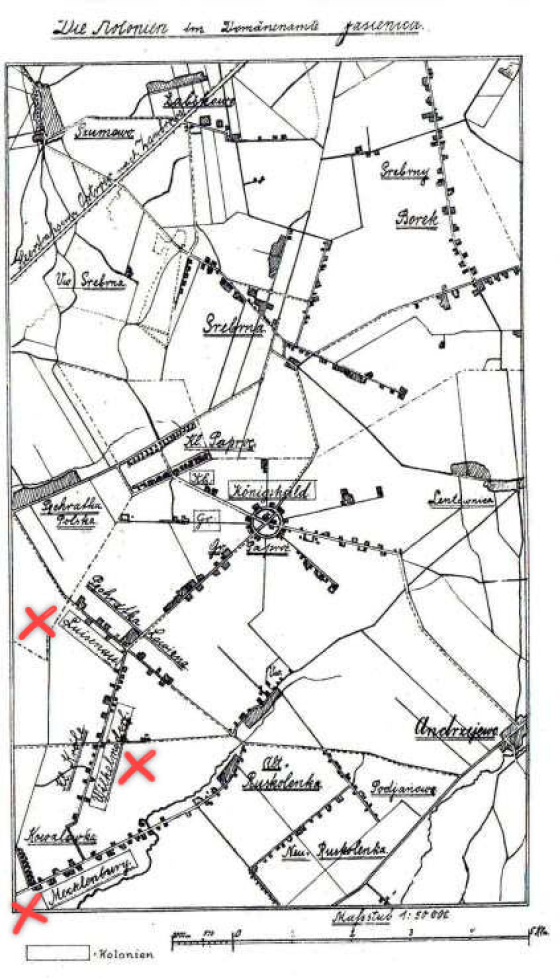_English_
User Tools
Site Tools
Sidebar
2.4.2.3 Krasnaer from Luisenau and Wilhelmsdorf (New East Prussia)
Another larger group of Krasna immigrant families came from the area of Ostrow, then New East Prussia (today Ostrów Mazowiecka, county seat in Mazovian Voivodeship).\ Frederick William III, who took over the government in 1797, devoted his main attention to colonization of this sparsely populated land. The territory was surveyed and divided into settler sites.
“New East Prussia” was to be settled with German peasants, cultivated and secured from the outside. Favorable settlement conditions were advertised: Issuance of travel money, free extensive land allocation, free construction of residential buildings, free provision of economic equipment and necessary livestock, 3 to 6 free years, moderate taxes, free practice of religion and freedom from military service for the colonists and their immigrant sons.
Arable land was generally not available. Mostly sandy, boggy forests were made available for clearing. Grubbing fees were paid and tools provided for the time of clearing.
Later Krasnaer we find in the language island Königshuld with the colonies
- Luisenau
- (Pęchratka Lowizna, Pechratka) 1803-1806
- Wilhelmsdorf
- (Króle Duże, Króle), 1803-1806
- Gross Königshuld
- (Paproć Duża) 1803-1806
- Klein Königshuld
- (Srebrna), 1803-1806
- Mecklenburg
- (Kowalowka) 1803-1806
In the Prussian period the colonies belonged to the Jasienica Domain Office in the triangle of towns Lomza- Zambrow- Ostrow Mazowiecka.
Gross Königshuld/Paproć Duża has a star-shaped symmetrical structure, i.e. all streets run exactly concentrically towards a large round square in the center. Starting from this center point, the settlement of the four colonies Königshuld, Luisenau, Wilhelmsdorf and Mecklenburg was first tackled. In the spring of 1805, they counted a total of 138 places, which were not yet completely occupied in the following year. The Prussian administration did not have the chance to finish the started work, because in 1807 this region fell to the Duchy of Warsaw.
According to A. Beyer, these four villages were settled mainly by Mecklenburg colonists. A family from Krasna in Mecklenburg is documented: “Ulrich, widow, née Maria Vogt, tr. with Joh. Gottfried Ulrich, servant on the tar kiln of his father, Johann Martin Ulrich, 1786, 20.11. (K.B. Woldegk), emigrated from Godendorf 1803 to Wilhelmsdorf, farmer. Father: Joachim Vogt, master weaver and owner at Godendorf; emigrates with 6 children.” Source: Martha Müller; Mecklenburger in Osteuropa, Marburg, 1972, p. 326.
In the files on the settlement of colonists in New East Prussia in the Secret State Archives in Berlin there is a list of settlers in the colonies of Mecklenburg, Wilhelmsdorf, Luisenau and Königshuld. It includes several families who migrated on to Krasna.
Source: II. HA Generaldirektorium, Abt. 11 Neuostpreußen, VI, - Nr. 1104 Nachweisungen der Kolonisten auf dem platten Lande, 1806, Seiten 82 -129.
| Name of the settler | Migration to Russia | Colony in Bessarabia |
| Colony of Mecklenburg | ||
| Carl Rühtz | Krasna/Tarutino | |
| Colony Wilhelmsdorf | ||
| Witwe Ulrich | Ulrich, (widow) 1814 Col. Wilhelmsdorf with children | Krasna |
| Theobold Riehl | Ryll, Theopold (?) 1814 Col. Wilhelmsdorf with family | Krasna |
| Colony Luisenau | ||
| Friedrich Ruekert | Krasna | |
| Georg Braun | Braun, Johann Georg 1814 Col. Louisenau with family | Krasna |
| Sebastian Merz | Merz, Michael 1814 Col. Louisenau | Krasna |
| Bernhardt Kopp | Krasna | |
By August Müller 'Die südpreußische Kolonisation in Nordpolen'. Berlin 1928. In ‘Deutsche Blätter in Polen’ 1928, Page 324-333 it says on page 328:
“The settlers of Königshuld and Schroettersdorf, did not all stay on the territory on which they were set and which they had laboriously wrested from the swamp and the forest. After the loss of Prussian rule in 1807, the tax burdens became so oppressive that some migrated on to the cities, others to southern Russia and Bessarabia.
The immigrant colonists belonged to Prussia for only three to four years; from 1807 to 1815 the area belonged to the Duchy of Warsaw.
The relevant church books contain births, marriages and deaths only from 1808 on, no wonder that hardly any Krasna people are found there. Proven so far according to the church book of Jasienica # 57 is the birth of Johann Riehl am 02. September 1807..


